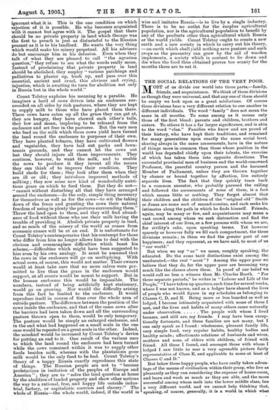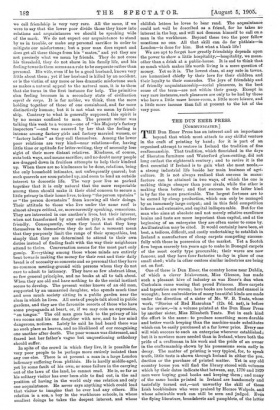M OST of us divide our world into three parts,—family, friends,
and acquaintance. We think of these divisions as though they were universal, and that any one of them should be empty we look upon as a great misfortune. Of course these divisions bear a very different relation to one another in different individuals. The word " family " does not mean the same in all mouths. To some among us it means only those of the first blood : parents and children, brothers and sisters. To others it has a far larger significance, and is akin to the word "clan." Families who know and are proud of their history, who have kept their traditions, and remained for many generations upon exactly the same social level, sharing always in the same amusements, have in the nature of things more in common than those whose position in the world has depended chiefly upon their talents, the exercise of which has taken them into opposite directions. The successful provincial man of business and the world-renowned Professor, the peaceful country parson and the harassed Member of Parliament, unless they are thrown together by chance or bound together by affection, live entirely separate lives. The fact that they quickly trace back to a common ancestor, who probably pursued the calling and followed the amusements of none of them, is a fact which means little or nothing. They forget almost that their children and the children of the "original old" Smith or Jones are some sort of second-cousins, and each seeks his intimates along the path in which be finds himself. Friends, again, may be many or few, and acquaintances may mean a vast crowd among whom we seek distraction and find the chief interest of our lives, or a few persons with whom we are, for civility's sake, upon speaking terms. Yet however sparsely or however fully we fill each compartment, the three divisions remain ; in them we find the greater part of our happiness ; and they represent, as we have said, to most of us. "our world."
But when we say " us " we mean, roughly speaking, tho educated. Do the same tacit distinctions exist among the uneducated,—the real "most" P Among the upper poor we believe that they do, for the upper poor are becoming very much like the classes above them. In proof of our belief we would call no less a witness than Mr. Charles Booth. "For three separate periods," he writes in "Labour and Life of the People," "I have taken up quarters, each time for several weeks, where I was not known, and as a lodger have shared the lives of people who would figure in my schedules as belonging to Classes C, D, and E. Being more or less boarded as well as lodged, I became intimately acquainted with some of those I met, and the lives and habits of many others came naturally under observation The people with whom I lived became, and still are, my friends. I may have been excep- tionally fortunate, and three families are not many, but I can only speak as I found : .wholesome, pleasant family life, very simple food, very regular habits, healthy bodies and healthy minds ; affectionate relations of husbands and wives, mothers and sons, of elders with children, of friend with friend. All these I found, and amongst those with whom I lodged I saw little to mar a very agreeable picture fairly representative of Class E, and applicable to some at least of Classes C and D."
But below these happy people, who have really taken advan- tage of the means of civilisation within their grasp, who live as pleasantly as they can considering the expense of house-room, and learn and wash as much as they are able, and the more successful among whom melt into the lower middle class, lies a very different world, and we cannot help thinking that, speaking, of course, generally,. it is a world in which what we call friendship is very very rare. All the same, if we were to say that the lower poor divide those they know into relations and acquaintances we should be speaking wide of the mark. We do not expect our acquaintance to stand by us in trouble, or make any personal sacrifice in order to mitigate our misfortunes ; but a poor man does expect and does get all these things from his "mates," and yet they are not precisely what we mean by friends. They do not cross his threshold, they do not share in his family life, and his feeling towards them seems as a rule to be corporate rather than personal. His wife, even if he be a good husband, knows very little about them ; yet if her husband is killed by an accident, or is the victim of any more or less dramatic misfortune such as makes a natural appeal to the natural man, it is to them that she turns in the first instance for help. The primitive clan feeling becomes in a secondary state of civilisation esprit de corps. It is far nobler, we think, than the mere holding together of those of one cousinhood, and far more distinctively human; but it is not what we mean by friend- ship. Contrary to what is generally supposed, this spirit is by no means confined to men. The present writer was talking this week to a woman—one of "his Majesty's factory inspectors "—and was assured by her that the feeling is intense among factory girls and factory married women, or "factory ladies" as they call themselves. Among the lower poor relations are very kind—near relations—for, having little time or aptitude for letter-writing, they of necessity lose sight of their more distant relatives. Kindness, of course, cuts both ways, and means sacrifice; and no doubt many people are dragged down in fruitless attempts to help their kindred up. When there are no kindnesses to be done, relations, being the only household intimates, not unfrequently quarrel; but such quarrels are soon patched up, and seem to lend an outside interest to domestic life. The very poor live so packed together that it is only natural that the more respectable among them should make it their chief concern to secure a little privacy in their home lives, to keep "the person upstairs" or "the person downstairs" from knowing all their doings. Their attitude to those who live under the same roof is almost always critical, or, more correctly speaking, censorious. They are interested in one another's lives, but their interest, when not transformed by any sudden pity, is not altogether friendly. Consequently, when they boast that they keep themselves to themselves they do not for a moment mean that they purposely limit the range of their sympathies, but simply that they are determined to attend to their own duties instead of finding fault with the way their neighbours attend to theirs. Conversation means for the most part only gossip. Everything among those whose minds are entirely bent towards making the money for their rent and their daily bread is of necessity so concrete and so personal that they have no common meeting-ground with persons whom they do not care to admit to intimacy. They have so few abstract ideas, so few general principles, and no books at all to talk about. When they are old and have nothing to do the social instinct seems to develop. The present writer knows of an old man, supported by an unmarried daughter, who spends much time and sees much society sitting in a public garden near the slum in which he lives. All sorts of people talk aloud in public gardens, and they are the favourite resorts of those who have some propaganda at heart, or, if we may coin an expression, "on tongue." The old man goes back to the privacy of his two rooms and his one daughter with new, and to her mind dangerous, notions. Lately he said he had heard there was no such place as heaven, and no likelihood of our recognising one another after death. The poor woman was distressed, and feared lest her father's vague but unquestioning orthodoxy should suffer.
In spite of the crowd in which they live, it is possible for very poor people to be perhaps more entirely isolated than any one else. There is at present a man in a large London infirmary suffering from phthisis. He is hardly middle-aged, yet by some fault of his own, or some failure in the carrying out of the laws of the land, he cannot read. He is, so far as his solitary visitor has ever been able to find out, in the sad position of having in the world only one relation and only one acquaintance. He never says anything which could lead that visitor to imagine that he ever had any others. His relation is a son, a boy in the workhouse schools, in whose, smallest doings he takes the deepest interest, and whose childish letters he loves to hear read. The acquaintance could not well be described as a friend, for he takes no interest in the boy, and will not demean himself to call on a man in the workhouse. Beyond these two the poor fellow mentions no one. All that skill can do for phthisis—in London—is done for him. But what a blank life!
We are apt to forget how greatly friendship depends upon the power to show a little hospitality,—hospitality, we mean, other than a drink at a public-house. It is sad to think that so much which makes life worth living is a mere question of money. Yet so it is. The lowest class, at any rate in towns, are humanised chiefly by their love for their children and their loyalty to their comrades. The joys of friendship and of friendly acquaintanceship—social pleasures, in the best sense of the term—are not within their grasp. Except in very rare instances, such pleasures are only to be had by those who have a little more house-room, a little more leisure, and a little more income than fall at present to the lot of the very poor.







































 Previous page
Previous page